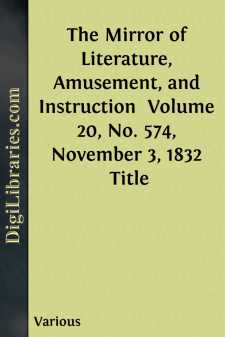Categories
- Antiques & Collectibles 13
- Architecture 36
- Art 48
- Bibles 22
- Biography & Autobiography 815
- Body, Mind & Spirit 144
- Business & Economics 28
- Children's Books 18
- Children's Fiction 14
- Computers 4
- Cooking 94
- Crafts & Hobbies 4
- Drama 346
- Education 58
- Family & Relationships 59
- Fiction 11834
- Games 19
- Gardening 17
- Health & Fitness 34
- History 1378
- House & Home 1
- Humor 147
- Juvenile Fiction 1873
- Juvenile Nonfiction 202
- Language Arts & Disciplines 89
- Law 16
- Literary Collections 686
- Literary Criticism 179
- Mathematics 13
- Medical 41
- Music 40
- Nature 179
- Non-Classifiable 1768
- Performing Arts 7
- Periodicals 1453
- Philosophy 65
- Photography 2
- Poetry 896
- Political Science 203
- Psychology 44
- Reference 154
- Religion 515
- Science 126
- Self-Help 85
- Social Science 83
- Sports & Recreation 34
- Study Aids 3
- Technology & Engineering 59
- Transportation 23
- Travel 463
- True Crime 29
Our website is made possible by displaying online advertisements to our visitors.
Please consider supporting us by disabling your ad blocker.
Punch, or the London Charivari, Volume 156, June 11, 1919
by: Various
Categories:
Description:
Excerpt
EMBARRASSMENT AND THE LAWYER.
Watson is a young barrister who is feeling rather pleased with himself. I confess that he has deserved it.
The situation was as follows. Before the War he had had no briefs, but had always had a conscience. A hopeless state of affairs. Then he went to the War and shed his conscience somewhere in the Balkans. So far so good. But, when he was demobilised and began to take stock of what had been happening at home in the meanwhile, he found to his horror that a conscience had again been thrust upon him by the General Council of the Bar.
Such was the situation he had to face, and he has won through.
How, you ask, did the G.C.B. play this trick on him? It happened in this way. Having nothing better to do during Watson's absence and at a critical moment of the War, these idle elderly well-fed lawyers solemnly deliberated upon the following fantastic problem:—
"What is the duty of counsel who is defending a prisoner on a plea of Not Guilty when the prisoner confesses to counsel that he did commit the offence charged?"
With a cynical disregard of their own past these sophists propounded the following answer:—
"If the confession has been made before the proceedings have been commenced it is most undesirable that an advocate to whom the confession has been made should undertake the defence, as he would most certainly be seriously embarrassed in the conduct of the case, and no harm can be done to the accused by requesting him to retain another advocate."
The new Watson was unable to agree with this doctrine, so far as it concerned himself. Nevertheless he had no choice but to accept it.
The legal conscience thus gratuitously thrust upon him was soon to undergo its first ordeal. An acquaintance of his, in a moment of absent-mindedness, murdered somebody, and asked Watson to persuade the inevitable jury that he hadn't. The said acquaintance explained to Watson that he simply did it when he wasn't thinking.
Watson was in a hole. Obviously this was a case to which the embarrassment prescribed by the General Council of the Bar was applicable. This legal embarrassment, which, strictly speaking, ought now to be his, would not, however, have worried him in the least had it not been for another consideration. Suppose, after Watson had triumphantly got his client acquitted, it got about that the "innocent" had confessed his crime to counsel beforehand? That would mean an end to Watson's professional career. One does not thus slight the edicts of the mighty with impunity.
Watson was too proud to ask his client to keep the deadly secret, or to apply the famous wriggle of Hippolytus: "My tongue hath sworn, but my heart remains unsworn."
Nevertheless Watson gave his mind to the problem. In the end he decided on the following line of defence: "Not Guilty," and in the alternative "Guilty under justifiable circumstances, without malice aforethought but with intent to benefit the person murdered."
Happily the General Council of the Bar has not yet assigned any moral embarrassment to a counsel who pleads "Not Guilty," and in the alternative, "Guilty." Watson therefore reasoned that if the jury returned a verdict of "Not Guilty," his client's alternative confession could be written off as an obvious mistake; on the other hand, if he were found "Guilty," the fact of confession would be an ethical asset towards securing for him a lenient view of the case....












